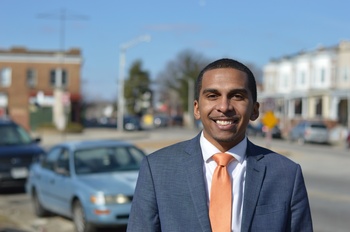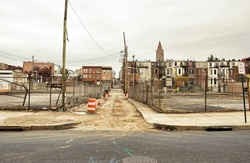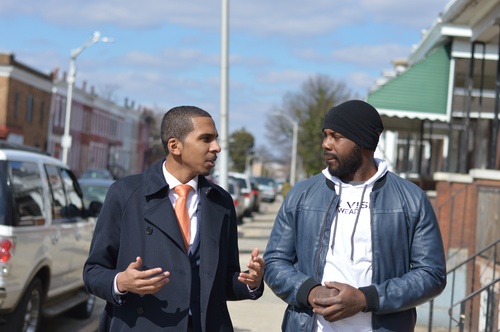
By Alula Eshete, Harvard Business School Class of 2017 & Harbus C.E.O.
According to Harvard Business School's recruiting statistics, the most sought out industries by HBS graduates are financial services and consulting, together consistently drawing in over half of the school's graduating classes. The class of 2015 statistics support that narrative, with 31% of graduates entering financial services and 24% joining a consulting firm. Contrast that with the fact that less than one percent of the 2015 HBS graduates assumed roles in government. This divergence inspired the Harbus to reach out to Calvin Allen Young III, a 2015 HBS alumnus who is running for Mayor of Baltimore.
A proud Baltimore native, Young is one of four siblings raised in northeast Baltimore by his single mother, a correctional officer of 22 years. It was during his time as a student at one of the city's engineering magnet high schools that he discovered his passion for technology. Though growing up in Baltimore was no fairytale story, Young credits his mother's perseverance for affording him access to a neighborhood and education that could serve as a springboard for him to eventually pursue his mechanical engineering degree at NYU.  Whether while working as a systems engineer for Sikorsky Cyclone or as a manufacturing supervisor for Pratt & Whitney, Young has always kept one foot in civic service. He served as National Chairperson for the National Society of Black Engineers (NSBE) and, most recently, on the Obama Administration's National Economic Council, where he worked on an initiative aimed at addressing the challenges small businesses face in accessing affordable working capital. Young points to his upbringing, education, and professional experiences when asked why he believes he knows how to best address the issues confronting Baltimore.
Whether while working as a systems engineer for Sikorsky Cyclone or as a manufacturing supervisor for Pratt & Whitney, Young has always kept one foot in civic service. He served as National Chairperson for the National Society of Black Engineers (NSBE) and, most recently, on the Obama Administration's National Economic Council, where he worked on an initiative aimed at addressing the challenges small businesses face in accessing affordable working capital. Young points to his upbringing, education, and professional experiences when asked why he believes he knows how to best address the issues confronting Baltimore.
Baltimore continues to be plagued with corruption, violence, and despair. Most recently, the city made headlines as Baltimore police faced scrutiny for the arrest and tragic death of Freddie Gray. When asked whether he felt Baltimore had been trending downwards since his departure, Young simply remarked, "it was bad and it remains bad". Citizens across the nation formed opinions on the heightened conflict and subsequent protests based on fragmented sound bites and news clips.  Many criticized the unrest for the damage it caused to the city, but a less shocked Young asserts that "anyone familiar with those neighborhoods knows that those neighborhoods have looked that bad for many years." Sadly, abandoned blocks, rat infestations, open drug markets and neglected trash heaps have been a reality for many Baltimore residents for decades. Baltimore's declining voter participation - 35.3% in the most recent Governor election - is just one indicator of the faltering hope among its citizens and their level of confidence in the political representation.
Many criticized the unrest for the damage it caused to the city, but a less shocked Young asserts that "anyone familiar with those neighborhoods knows that those neighborhoods have looked that bad for many years." Sadly, abandoned blocks, rat infestations, open drug markets and neglected trash heaps have been a reality for many Baltimore residents for decades. Baltimore's declining voter participation - 35.3% in the most recent Governor election - is just one indicator of the faltering hope among its citizens and their level of confidence in the political representation.
Despite this reality and the slew of manufacturing jobs that have continued to escape Baltimore, Young remains optimistic about the city's future. By prioritizing education system advancements, small business growth, and lead paint elimination, Young believes that Baltimore can rightfully reclaim its reputation as "Charm city". As NSBE Chairperson and long-time board member, leading strategies in favor of STEM (Science, Technology, Engineering, and Math) education and retention among black youth across universities nationwide remained a top priority of his. Attributing much of his success to the resources made available to him as a child, Young believes that "universal pre-kindergarten, algebra by 7th grade, and calculus by 11th grade should be standard in any modern day curriculum." Beyond these core components, Young also seeks to ensure that after school and recreational activities that expose adolescents to 21st century technologies, STEM, and the arts will no longer be the exception.
Responsible for employing half of the private sector and for creating two-thirds of new jobs in the U.S., small businesses remain a critical component of Young's plan to redirect Baltimore's trajectory. With plans to introduce microfinancing loans and incubator spaces, Young plans to support and encourage small businesses to create jobs in underserved neighborhoods. This, Young believes, will provide more of Baltimore's youth with viable opportunities and deter them from violent crime.
Today, Baltimore's African American population - representing two-thirds of the city's population - only own one third of local businesses; an imbalance in empowerment that Young believes is a factor in the increasing crime rate among the city's black youth.
Lead poisoning, an epidemic that plagues Baltimore's poor community, lays claim to over 5% of Baltimore's children, despite unfulfilled promises by leadership to eradicate the issue. Victims of lead poisoning - the late Freddie Gray, included - are exposed to a toxic contaminant that is known to cause permanent learning and behavioral challenges. While Young echoes other candidates' stance on holding lead paint manufacturers accountable, he believes that this strategy must be complemented with the "testing of parents as well as children at birth to allow for more targeted interventions early in the detection process".
In light of the recent Flint Water Crisis, negligence in public leadership has become a relevant topic of discussion. In response to a question about the similarities and differences between leadership across the private and public sector, Young had this to say: effective leadership is determined by how one is evaluated and perceived by constituents and civic organizations.
Young credits his experiences in both the private and the public sector for teaching him the valuable lessons he will need to leverage in successfully leading a citywide office. With respect to the private sector, Young says, "leaders have strayed from making long-term strategic decisions in favor of quarter-to-quarter decisions that create short wins." Considerations of environmental and human costs, it seems, have taken the back seat in these decision making processes. Young also acknowledges that the public sector leaders could take a page from the private sector and begin to "treat citizens more like customers and not just a vote". Young recognizes the tension between the pressure for immediate results and the need for meaningful transformations, but says that he is "willing to be that long-term thinker who makes the tough decisions in favor of sustainable solutions," should he be elected Mayor.
Young's passion for the city of Baltimore is undeniable, but his decision to uncharacteristically pursue a path of public service following Harvard Business School remains puzzling to some. While many recognize HBS as one of the best management institutions and training grounds for business leaders, Young says that people often lose sight of the school's broader mission of educating leaders who make a difference in the world. In fact, Young credits HBS for helping him realize that returning to Baltimore was the right way for him to begin making a difference. While assuming a role in industry or founding a start-up both serve as means for impact in certain contexts, Young asserts that "service in the public sector was the best way for me to make a difference given Baltimore's cultural and political realities". Equipped with his leadership training, lessons from career successes, and passion for Baltimore, Young enters this race determined to bring promise and opportunity to Baltimore.
While recent press has shined a light on the problems that plague Baltimore, Young admits that highlighting these problems at the national level has inspired him and so many other leaders in Baltimore to action. Pointing to what sets Baltimore apart, Young states: "Many people forget that Baltimore houses one of the best deep water shipping ports, a world-renowned medical system, and a biotech start-up scene second only to Boston's," adding that "with the right policies in place, we can leverage the impact of our growing tech start-up scene to create impact in marginalized neighborhoods". Home to Fort McHenry, where the Star Spangled Banner was written, Baltimore, Young believes, deserves a future as rich as its history.
On April 26, the citizens of Baltimore will decide whom they deem to be most fit to forge that future as they cast their votes for the primary elections. This year's Primary Election Day will occur just a day prior to the one year anniversary of the late Freddie Gray's funeral. While that period in Baltimore was stained by controversy and dissension, Young envisions a new narrative being written this April. A narrative that reflects new leadership and a new vision that promises to run against the grain of the status quo politics and policies that have struggled to address the needs of Baltimore. "If not now, then when?" asks Young.
For more on Calvin Young's Mayoral campaign, visit www.electcalvinyoung.com.
__________________________________________________________
Alula Eshete (HBS '17) is a first-generation Ethiopian-American and CEO of The Harbus. Prior to HBS, he spent 4 years working across several divisions of Abbott before joining GE's Global Growth & Operations group in Ethiopia. He enjoys exploring the world, making people laugh, and advocating for the voiceless.
For more articles published by The Harbus, please visit www.harbus.org.

